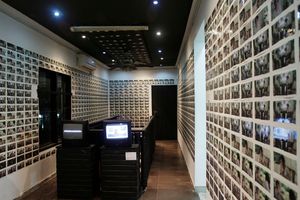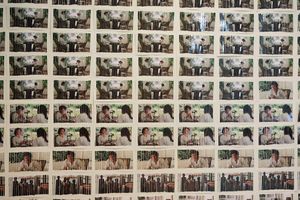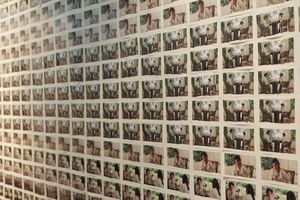Re-imagining Out of Africa
2015
Re-imagining Out of Africa_02_Production Still_2014_(c)Hopkins-5
Re-imagining Out Of Africa (concept Note, June 2014) - Sam Hopkins
One of the strange things about growing up in Kenya as a white person has been witnessing the resilience of a certain mythology within the white Kenyan community; a mythology that speaks of pioneers, settlers and extravagance, yet says nothing of subjugation, suppression and exploitation. It is a somewhat selective rendering of Kenya, and one in which both the Postcolonial context and Postcolonial discourse are notably absent. What is particularly interesting in this distorted collective memory is the role that is assigned to Karen Blixen of being emblematic of the white settlers, somewhat ironic considering she saw herself as both different from, and an outsider to, that community.
I choose the word 'assigned' both in terms of being attributed these qualities, as opposed to embodying them, but also in terms of becoming a sign and a signal for this mythology. And so Karen Blixen herself has become a myth, partly real, corporeal and existing, partly a fictitious character, shaped by herself in the book 'Out of Africa' partly a celluloid apparition from the film 'Out of Africa' made in Kenya in 1985 and partly the space which people project their fears and desires onto.
The slippage between person, character and film star is deeply palpable at the Karen Blixen museum in Nairobi. Visitors are greeted by guides, who immediately ask 'Have you seen 'Out of Africa?', before explaining that this house, Karen Blixen's house, was also the set for the film. Indeed, whilst most of the furniture inside is the original furniture of Karen Blixen, some items could not be traced, so the props from the film were used instead. Walking around the house it is not made clear which furniture is real and which is prop, an omission which casts the whole museum as a fiction. The grounds of the house also hold a coffee roasting plant, which was also assembled, from original parts, specifically for the film. The building, like the character Karen Blixen, thus becomes a hybrid space; part original, part reconstruction, part set, part stage, part real, but mainly fiction.
My proposal is not to investigate the fiction and myth of Karen Blixen through academic research, trying to parse the real from the fictitious, but rather the total opposite; to try and create a totally new fiction. This is also a research, albeit an artistic one, to explore what happens when you take this purely as a story. Perhaps explicitly de-contextualising it will reveal dimensions of Karen Blixen that the myth consistently obscured.
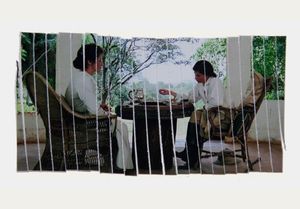
Re-imagining Out of Africa_02_Production Still_2014_(c)Hopkins-5
My idea is to work in Nigeria for a month, exploring the possibility of collaborating to produce a Nollywood version of Out of Africa. Nollywood, the Nigerian film industry, is the most prolific film industry in the world, a story of emergent organisation and grassroots distribution. Nollywood films are screened all over Africa, on TV, on buses, in bars; in both public and private spaces. It is also an intriguing story of changing ownership of image production; airtime for American and European content has drastically diminished in the face of the new Nigerian competition.
Hence, recasting Out of Africa as a Nollywood film is perhaps not so much a decontextualisation as a recontextualisation. On the one hand it tries to expose elements of the original narrative that might have been erased in the successive instrumentalisation of the story in Kenya. On the other hand, it is a provocation and investigation into representation and Africa. Whilst the book might be more complex, the film Out of Africa became both site and perpetrator of a particularly Eurocentric narrative on Africa. A narrative in which Africans were rendered mute and without agency. A Nollywood remake of the film is both an attempt to shift this distortion and to explore the challenges that shifting this distortion entails.
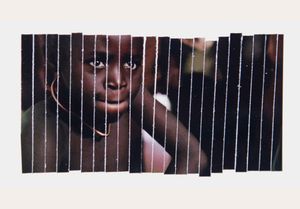
Re-imagining Out of Africa_02_Production Still_2014_(c)Hopkins-4
download text as PDF